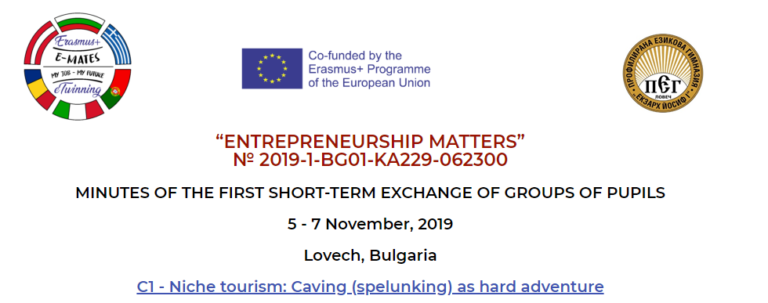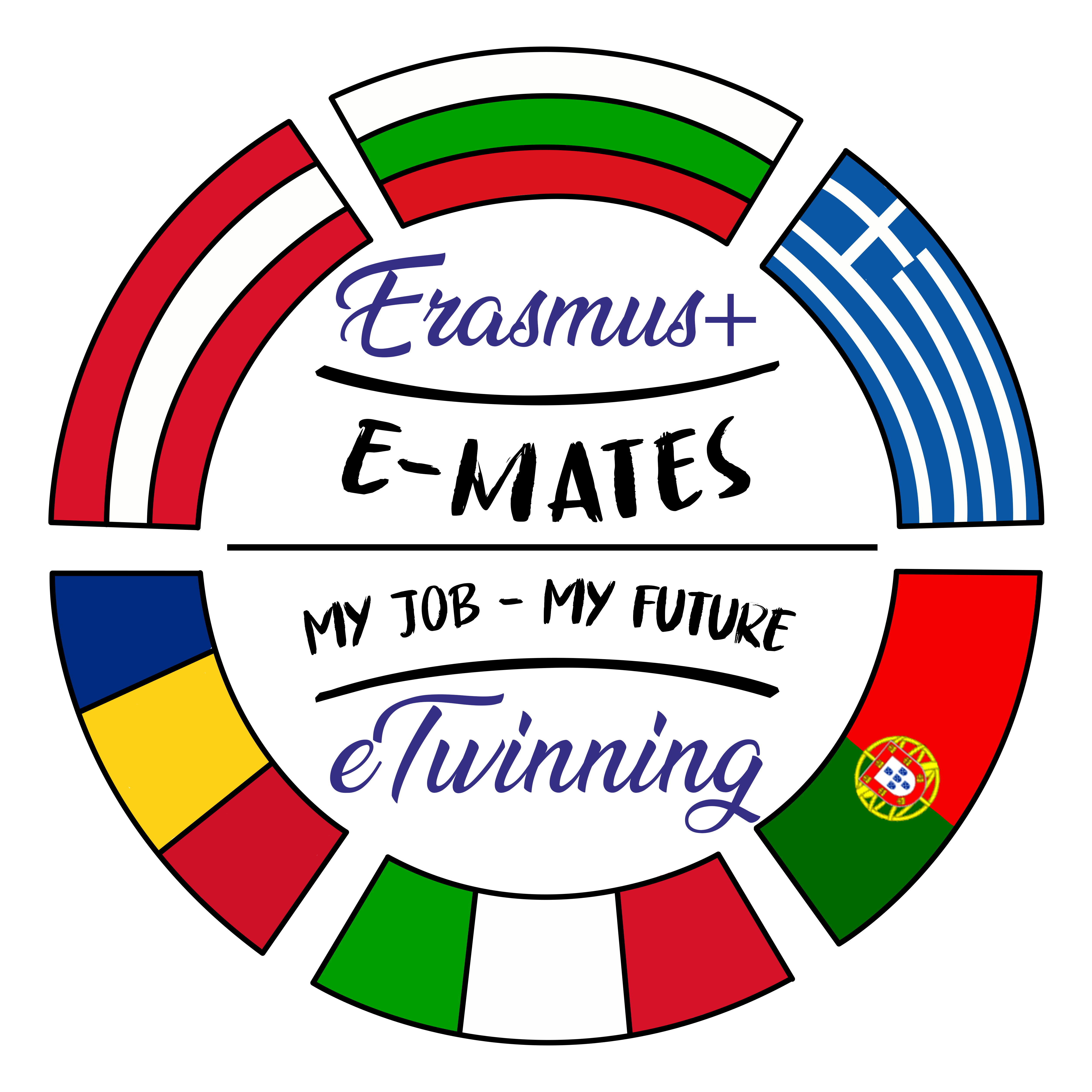
C1 Meeting Minutes
- Description of the realised programme of C1.
Between the 5th and the 7th of November 2019, pupils and teachers from all the partner schools involved in the Erasmus+ project “Entrepreneurship matters” attended the first short-term exchange of groups of pupils (C1), which was hosted by the coordinating school Profilirana ezikova gimnazia ‘Ekzarh Yossif I’ from Lovech (Bulgaria).
The official opening of the meeting was held on 5 November. The ceremony began with the addresses by the principal of the host school, Mr. Radoslav Hitov, and the official guests – Mr. Ilian Todorov, Deputy Regional Governor of the Lovech District, Mr. Ventsislav Hristov, Deputy Mayor of the Lovech Municipality, and Mr. Elenko Nachev, Head of the Regional Inspectorate – Lovech. The coordinators of the six partner schools together raised the EU flag under the sounds of “Ode to Joy”. The festive ceremony ended with folk dances, after which the guests were welcomed, as the old tradition goes, with home-made bread, in front of the America for Bulgaria Hall, where the presentation of the international teams took place during the press conference.
The program of this exchange was extremely interesting and varied. It included a visit to the Prohodna Cave in the town of Lukovit, which was the main purpose of the exchange. After learning about the interesting history of this natural phenomenon, the partner teams‘ task was to make proposals for the development of the site as an attractive tourist destination with the opportunities offered by virtual and augmented reality. Representatives of the Lukovit Municipality took care of the guests’ comfort during this visit and presented advertising materials to the partner schools.
On the morning of November 6, two trainings were held to disseminate good practices. The first one was a demonstration of the skills and competencies that young animators should possess, as well as an introduction to the day-to-day challenges they have to deal with. The second workshop aimed to introduce partners to the methodology of professional debates. An interesting presentation of the BEST Foundation – Bulgarian English Speech and Debate Tournaments was shown – with an emphasis on the performances of the Bulgarian students in the domestic tournaments. Then, under the tutelage of Ms. Allison Rice, a Fulbright Assistant English Teacher at the host school, pupils made an interesting debate on unpaid internships.
The visiting guests had the opportunity to become familiar with the achievements and the good practices of the hosting school, which has an impressive tradition in teaching foreign languages, through a video about the school, and by visiting regular classes.
The programme of the first exchange visit also included attending several landmarks that will be included in the tour guide the Partnership has planned to provide as a final product. The educational trips organised by the hosting team offered the guests the chance to visit the Troyan monastery and the Ethnographic complex in the village of Oreshak, as well as the landmarks of Lovech. The students not only made friends and had a lot of fun during all the activities of C1, but also learned a lot about their hosts‘ local community and country. They gained valuable skills in this cross-culture exchange and significantly improved their oral practice in the official language of the project – English.
All the participants in the first short-term exchange of groups of pupils became acquainted with the Bulgarian educational system and with innovative approaches in school management, as well as with the local culture, folk crafts and customs, cuisine and lifestyle of Bulgaria. Students and teachers alike improved their communication skills in English, and their interpersonal abilities, promoted their own cultural and educational achievements, got a stronger sense of European belonging, and became part of the e-mates family.
- Acquired competences and skills.
During this physical mobility, the students acquired many useful competences, such as: getting a better idea of what entrepreneurship is all about, strengthening their creative and critical thinking skills, being open-minded towards inclusion, cultural diversity and tolerance in education, improving their leadership skills, and their ability to work in transnational teams. As a result of taking part in this learning/teaching/training activity, the teachers shared good practices with their foreign colleagues, developed their ability to identify and seize various opportunities, and became familiar with methods of promoting and assessing the students’ soft skills in the field of democratic citizenship, human rights and intercultural understanding. School administrators learned how to promote the outward-looking approach in school, and improved their managing skills in project-based transnational learning. Throughout the exchange, parents and members of the local community became an integral part of the e-Mates spectacular activities.
- Project documentation.
3.1. All the obligatory project paperwork was done: attendance lists, program copies, certificates.
3.2. The coordinators of the six partner schools agreed upon that each host coordinator should be in charge of the minutes of the six approved physical mobilities (C1-C6); mostly because of the details about landmarks, involved stakeholders‘s names, etc.
3.3. The coordinator of the project initiated the C1 event on Mobility Tool so that all the partner teams could create their groups on this platform in the due time.
- Project issues.
Because of the short visit, and the intense program of C1, the partners had little time to discuss all the issues that such a challenging project had evoked. That‘s why Mrs Dobreva planned an online meeting for all the coordinators of the Partnership for the following week on the project TwinSpace. Some of those involved:
4.1. Running the project tasks in eTwinning smoothly and within deadlines;
4.2. Issues concerning the MobilityTool platform;
4.3. Organising C2 and C3;
4.4. Dissemination of project activities ( articles for the local media, blogs, partners‘ YouTube channels, etc.);
4.5. Working on the design of the project website;
4.6. Attracting more stakeholders to the project.
- Tasks to be done after the end of C1 include:
5.1. The foreign participants in the first school exchange have to share their impressions about this educational visit with peers from all the partner schools in the eTwinning forum. Their memories will serve as a comparative analysis between their expectations and final outcomes. Negative responses, if any, will be taken into consideration for a better planning of the following physical mobilities.
5.2. They have to forward the gathered information from the targeted tourist destinations in Bulgaria to their peers for further online processing. Pupils’ assignment will be to surf the Internet and provide best examples of caving as a targeted niche tourism. By comparing those with the visited cave in Lovech region, they have to generate ideas, and make concrete suggestions about how virtual and augmented realities can attract more tourists.
5.3. Through the virtual exchanges on eTwinning, pupils will also brainstorm creative ideas about the factsheets they have to produce, practicing their convergent and divergent thinking in the process.
5.4. They will also have to select the best pictures from the exchange in order to start working on another final product an interactive tourist guide about the partner regions.
5.5. Training materials from the two workshops the workshop, together with the videos and pictures from the entire exchange, will be disseminated on various channels for greater impact.
5.6. All the partner teams have to disseminate the first short-term exchange of groups of pupils (C1) via all available channels.
- Conclusion.
All in all, the first physical contact of representatives of the six partner schools did achieve its main goal – to mark the beginning of a fruitful future cooperation via lessons learned and good practices shared. All the activities were carried out according to the updated action plan and the program of C1, after the days for each physical exchange with groups of pupils had been officially reduced from 5 to 3.
The coordinators of the partner schools are determined to apply the best of their professional skills and competences in order to achieve the project final goals and objectives.
Margarita Dobreva,
Project Coordinator
